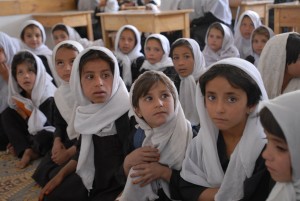The Nooristan Foundation (NF) engages in ongoing efforts to help residents in various regions of Afghanistan to surmount the challenging social and economic realities posed by more than three decades of conflict and political upheaval. The nonprofit provides support for emergency aid, educational and vocational training programs, and improved health care services. Seeking to deliver more than temporary humanitarian relief, the directors of NF aim to equip the Afghans that they serve with the resources and skills necessary to become active participants in the development of their communities.
Aid Across Afghanistan
Following the beginning of the Soviet-Afghan War in 1979, the NF’s founder, Dr. Nadir Atash, moved out of Afghanistan. He and his family had been prominent members of the community in Nooristan, a province in northeast Afghanistan that runs along the southern side of the Hindu Kush mountain range to the border with Pakistan. Convinced of the need to foster renewed development in a region where heavy combat between the mujahedeen and Soviet Army had taken place throughout the 1980s, Dr. Atash established NF in 1999.
 The foundation concentrated its early work on the provision of materials, equipment, and transportation for community members in the secluded villages of Nooristan to build water wells and irrigation systems, micro-hydro-electric installations, and rural roads. For example, in western Nooristan the foundation provided the turbines, generators, and other components for three hydro-electric facilities built and maintained by residents of Ameesh, Gezeen, and Pacha, villages where residents previously lacked electric light. During this period, NF also facilitated education and training initiatives, including multiple school construction projects and a teacher-training program through which 30 educators from Nooristan studied math, science, and technology in the nation’s capital, Kabul.
The foundation concentrated its early work on the provision of materials, equipment, and transportation for community members in the secluded villages of Nooristan to build water wells and irrigation systems, micro-hydro-electric installations, and rural roads. For example, in western Nooristan the foundation provided the turbines, generators, and other components for three hydro-electric facilities built and maintained by residents of Ameesh, Gezeen, and Pacha, villages where residents previously lacked electric light. During this period, NF also facilitated education and training initiatives, including multiple school construction projects and a teacher-training program through which 30 educators from Nooristan studied math, science, and technology in the nation’s capital, Kabul.
Building on its work in Nooristan, NF expanded the reach of its operations to other Afghan provinces. The foundation has since completed a broad array of projects throughout the country, ranging from the construction of two wells to provide potable water for roughly 4,500 residents and refugees in the Chaman Hozori area of Kabul, to helping ImagineAsia conduct assessments for the distribution of supplies to schools in Bamiyan province. For the past several years, NF has devoted its resources to three project areas: educational development, midwife training, and its New Beginnings program for the more than 90 families living in the Baghe Daoud refugee camp outside of Kabul.
Meeting Challenging Educational Needs
To help address the lack of educational institutions in Nooristan province, NF partnered with the Afghan NGO Nooristan Mountain Schools (NMS) and in 2009 established an elementary school in the isolated village of Pasigam. The school serves approximately 70 local boys and girls, with NF supplying the financing for teacher salaries, classroom materials, and rent for a temporary space in which to hold classes. In 2011, the leaders of NF and NMS finalized a plan for the construction of a permanent school building, through which NF provides building materials and equipment, and the Pasigam village council will contribute both the land and labor of its community members. With the cooperation of Sakeena Jacobi, a Nobel Prize-nominated educator and leader of the Afghan Institute of Learning, NF and NMS also secured free professional training for seven of the Pasigam school’s teachers. However, the completion of the school has been postponed since the end of 2011.
Improving Pregnancy Care by Training Midwives
 In the rural regions of Afghanistan, an overwhelming majority of people give birth without professional medical assistance, and the country maintains one of the highest maternal mortality rates in the world. Viewing midwives as crucial obstetric providers in these remote areas, NF joined with the Marigold Foundation and the Afghan Midwives Association to finance and implement a two-year program that provided 80 midwives in Takhar province with training in child delivery, as well as prenatal, labor, and postpartum care. The number of trained midwives in Afghanistan, though greatly increased since 2002, remains far below the more than 4,500 necessary to attend to 90% of pregnancies. Acknowledging this deficit, NF has undertaken preliminary activities to facilitate another midwife training program in an underserved province, such as Logar.
In the rural regions of Afghanistan, an overwhelming majority of people give birth without professional medical assistance, and the country maintains one of the highest maternal mortality rates in the world. Viewing midwives as crucial obstetric providers in these remote areas, NF joined with the Marigold Foundation and the Afghan Midwives Association to finance and implement a two-year program that provided 80 midwives in Takhar province with training in child delivery, as well as prenatal, labor, and postpartum care. The number of trained midwives in Afghanistan, though greatly increased since 2002, remains far below the more than 4,500 necessary to attend to 90% of pregnancies. Acknowledging this deficit, NF has undertaken preliminary activities to facilitate another midwife training program in an underserved province, such as Logar.
Empowering the Refugees of Baghe Daoud
In 2007, roughly 600 displaced people at the Baghe Daoud refugee camp were living in deprivation, with rundown Soviet Army barracks for shelter. NF initiated the New Beginnings program by providing these families with necessities such as food, blankets and clothing, plastic tarps, and fuel through the winter of 2008-2009.
With the greater goal of helping the refugees to obtain the requisite skills for assimilating into the surrounding society, NF collaborated with the organization PARSA to operate literacy courses attended by more than 100 adults and children from the camp.
Bringing further hope for future prospects to the Baghe Daoud community, NF has enrolled 60 children in a government-administered school within two kilometers of the camp. The foundation has also supplied the children with school uniforms, textbooks, and backpacks, as well as distributed 300 bicycles to meet the families’ transportation needs.
